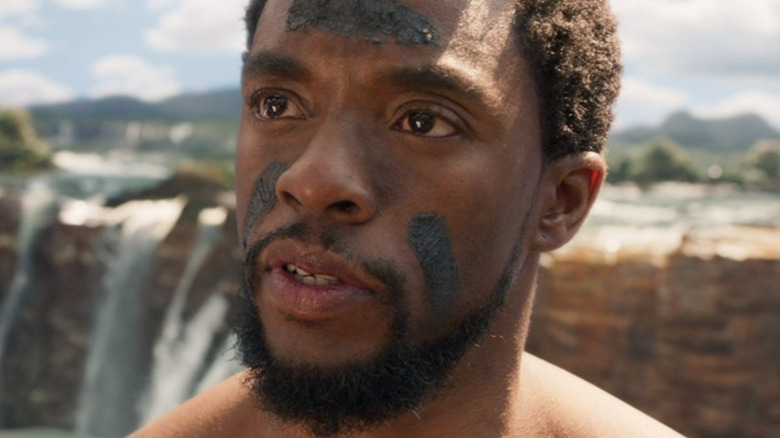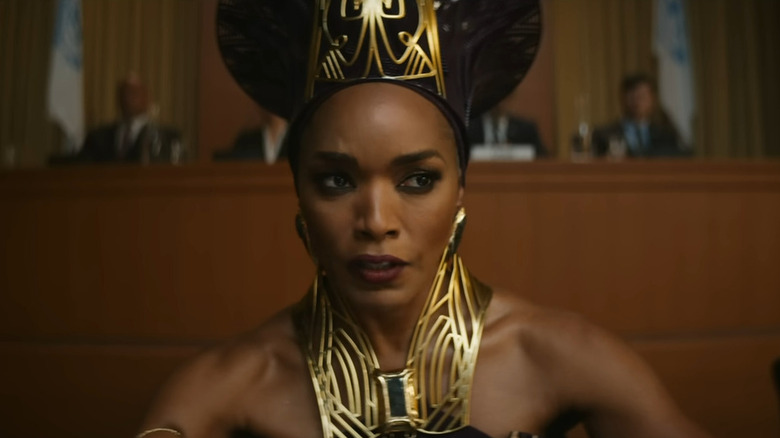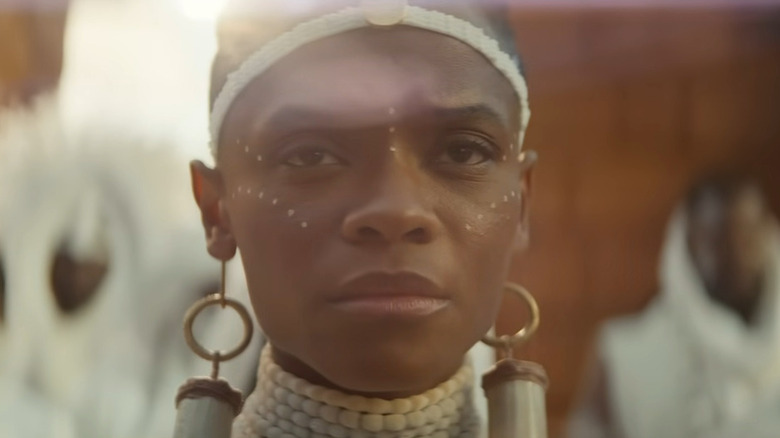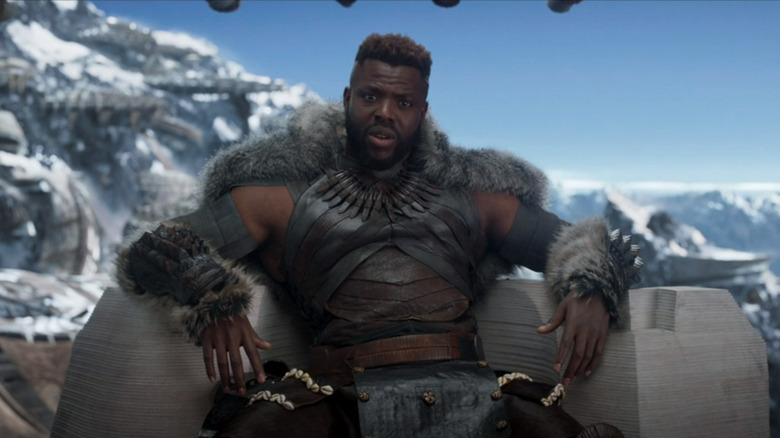This Is How Wakanda's Succession Rules Work
Contains spoilers for "Black Panther: Wakanda Forever"
Phase Four of the Marvel Cinematic Universe has finally come to a close. After introducing enough characters to reload the entire Avengers roster twice over, the most diverse phase took a bow in Wakanda with the sequel to Ryan Coogler's "Black Panther." The return was a welcome one since the citizens of Earth-616's most highly advanced society are beloved by nearly all who have witnessed their vibranium-infused splendor, but it was somber too.
"Black Panther: Wakanda Forever" follows the royal family in the wake of a terrible tragedy, the death of T'Challa, whom Marvel opted to lay to rest in tandem with the passing of the actor who played him, Chadwick Boseman. In this way, the story becomes in part about succession. Who will take his place as king? Who will take his place as the Black Panther?
Those questions aren't what we're here to talk about today, although we will circle back to them in a bit, but rather the act of succession itself. Wakanda seems to abide by a unique combination of laws and strictures that permit a new leader to take the throne, although these are never spelled out in a wholly digestible way. Here's how they work.
The MCU rules of succession
In the MCU, the rules of succession are twofold. The first rule, although never stated outright, is that of a typical monarchy: The eldest-born child of the current ruler is the first in line to take up the crown from their parents. However, it doesn't seem to be male-oriented. In the wake of T'Challa's death, Ramonda (Angela Bassett) reclaims the throne, and in the wake of her death, it's assumed by the people of Wakanda that Shuri (Letitia Wright) will rise to take her place. Of course, a country whose greatest warriors are an organization comprising exclusively women would hardly shrink from the idea of one ascending the throne.
The second rule — and this one is directly shown in the "Black Panther" films — is that before a prospective ruler can claim their title, they must offer themselves up for battle at Warrior Falls. That's where T'Challa fights both M'Baku (Winston Duke) and Erik Killmonger (Michael B. Jordan). The battles at Warrior Falls permit hopeful leaders a bid for power, and it is the responsibility of the incumbent to fight to maintain their own authority. The person next in line is only obligated to accept challenges made before their rule begins, but they may also take on a contestant at any point in their reign.
A note: While not specified in the films, the title of Black Panther is separate from the title of leader. It is the current leader's right to choose who takes up the mantle of the Black Panther — they just usually choose themselves, as T'Challa does, and as his father, T'Chaka (John Kani), does before him.
The Marvel Comics rules of succession
The rules of succession in the comics are a bit more complicated because Marvel does this charming (read: frustrating) thing where it reboots the entire universe every couple of years so that the same stories can be retold in a slightly different way. With that in mind, the monarchy stuff is the same, including the feminist mentality toward female leadership, but the trials at Warrior Falls are an aspect created for the films. The waterfall does exist in the comics, and T'Challa does suffer a nasty defeat at the hands of Killmonger there, but the rest is unique to the MCU (via Marvel Database). Of course, there are exceptions to this structure, because comics lore is nothing if not contradictory, but that's the long and short of it.
The really complicated stuff comes into play when one understands that the combined role of ruler and Black Panther kind of makes the individual in power a religious leader too. According to canonical legends, the Black Panther is basically a mortal vessel for Bast, the cat goddess (via Marvel Database). Political, military, and religious power ... all wrapped up into one. Good thing the Black Panther is usually on our side, yeah?
The future of Wakanda
In the last moments of "Black Panther: Wakanda Forever," Shuri renounces her claim to the throne and journeys to Haiti, where she plans to spend time with Nakia (Lupita Nyong'o) and although she doesn't know it at first, her nephew, Toussaint (Divine Love Konadu-Sun). The people of Wakanda only realize that Shuri is gone when M'Baku arrives at the gathering at Warrior Falls in her stead, raising his own challenge for the throne. Then the screen cuts away, leaving us with more questions than answers.
Did Shuri grant him her blessing, assuming that she even told him that she wouldn't be sticking around? If she did, can M'Baku make a claim for the throne if there's no incumbent for him to do battle with? Is he going to be the next King of Wakanda? If so, will M'Baku strip Shuri of her title as Black Panther so that can bear it himself?
It seems likely that Shuri warned him of her decision since she knew that he would be the most likely candidate for leadership. Besides, the two are closer in this movie than in the first, almost like cousins. As for M'Baku's challenge for the throne, there's little chance that Wakanda would ignore him just to wait for Shuri, especially after he's proved himself a clear and prescient defender of the country twice. He might find different opposition from an as-yet-unknown party, but M'Baku's rise to kingship feels assured. As to whether he would reassign the title of Black Panther, well, that depends on the plot of "Black Panther 3."



